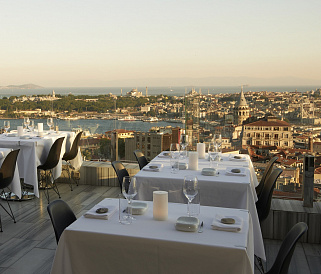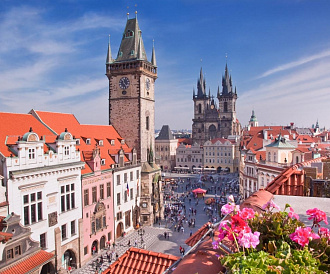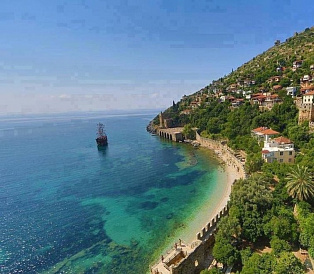20 best books of classical literature
World literature is proud of its representatives, who, despite the difference of eras, are united by one thing - this is talent and dedication to their work. Great writers have made an invaluable contribution to its development, reflected the characteristics of their countries and the time in which they lived. Their creations are immortal, and each new generation is enthusiastically read out by stories and narratives, novels and essays by authors whose names are widely known, and they need no introduction.
The experts of our journal have selected 20 works of classical literature in the rating, many of which are included in the general education school curriculum, and some are simply recommended for reading.
Rating the best books of classical literature
| Nomination | a place | composition | rating |
| The best books of Russian classical literature | 1 | "War and Peace" by Leo Tolstoy | 4.9 |
| 2 | "The Master and Margarita" Mikhail Bulgakov | 4.9 | |
| 3 | "Dead Souls" Nikolai Gogol | 4.8 | |
| 4 | “Crime and Punishment” Fyodor Dostoevsky | 4.8 | |
| 5 | "Doctor Zhivago" Boris Pasternak | 4.8 | |
| 6 | "Eugene Onegin" Alexander Pushkin | 4.7 | |
|
|
7 | "Hero of Our Time" Mikhail Lermontov | 4.7 |
| 8 | "Fathers and Sons" Ivan Turgenev | 4.6 | |
| 9 | “Woe from Wit” Alexander Griboedov | 4.5 | |
| 10 | "The Cherry Orchard" Anton Chekhov | 4.5 | |
| The best books of foreign classical literature | 1 | Romeo and Juliet by William Shakespeare | 4.9 |
| 2 | "Don Quixote" Miguel Cervantes | 4.9 | |
| 3 | "The Count of Monte Cristo" Alexandre Dumas | 4.8 | |
| 4 | "Faust" Johann Wolfgang von Goethe | 4.8 | |
| 5 | "Martin Eden" Jack London | 4.7 | |
| 6 | "Headless Horseman" Mine Reed | 4.7 | |
| 7 | "Outcast" Victor Hugo | 4.7 | |
| 8 | "Three Comrades" by Erich Maria Remarque | 4.7 | |
| 9 | "The Old Man and the Sea" Ernest Hemingway | 4.6 | |
| 10 | "The Little Prince" by Antoine de Saint-Exupery | 4.6 |
The best books of Russian classical literature
"War and Peace" by Leo Tolstoy
Rating: 4.9
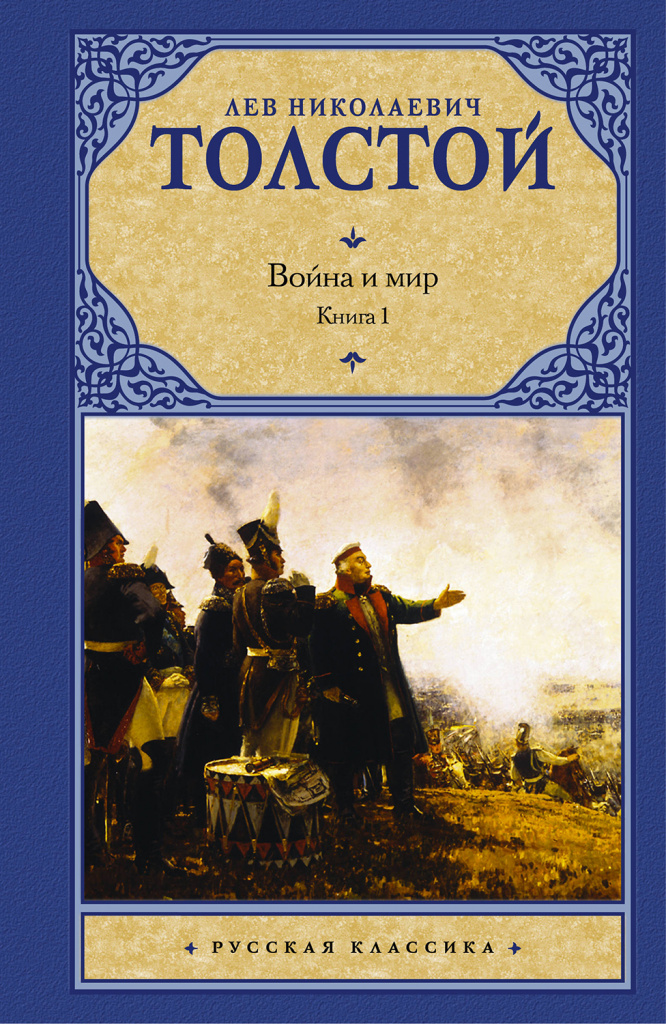
The list is headed by the novel of the Russian writer Leo Nikolayevich Tolstoy, who is considered one of the greatest classical works. It covers the time in the period 1805-1812. The epic novel consists of 4 volumes. In the first, the action takes place in 1805-1807. The second volume reflects the peaceful life of the Russian society 1806-1812. The last book begins with the invasion of Napoleon’s army into the country.
In “War and Peace” there are many chapters and parts, some of which have a plot completeness. The author moves the reader in space and time, but it is so delicate that does not confuse, but, on the contrary, strengthens the impression and adds interest. The main idea of the book is revealed to the end: the Russian people are invincible, which once again proved the complete defeat of Napoleon’s army.
Many of us in our youth were read by the work, noting the most interesting moments. The boys were fascinated by the hostilities, the girls - a description of dresses, carriages, palaces. Many of them wanted to be like Natasha Rostov and Andrei Bolkonsky. Older people were able to appreciate the subtleties and complexities of the relationship of the characters. Even the minor characters are not deprived of the attention of the author. In total there are 550 of them in the work. The epochal book leaves no one indifferent, many reread it several times.
"The Master and Margarita" Mikhail Bulgakov
Rating: 4.9
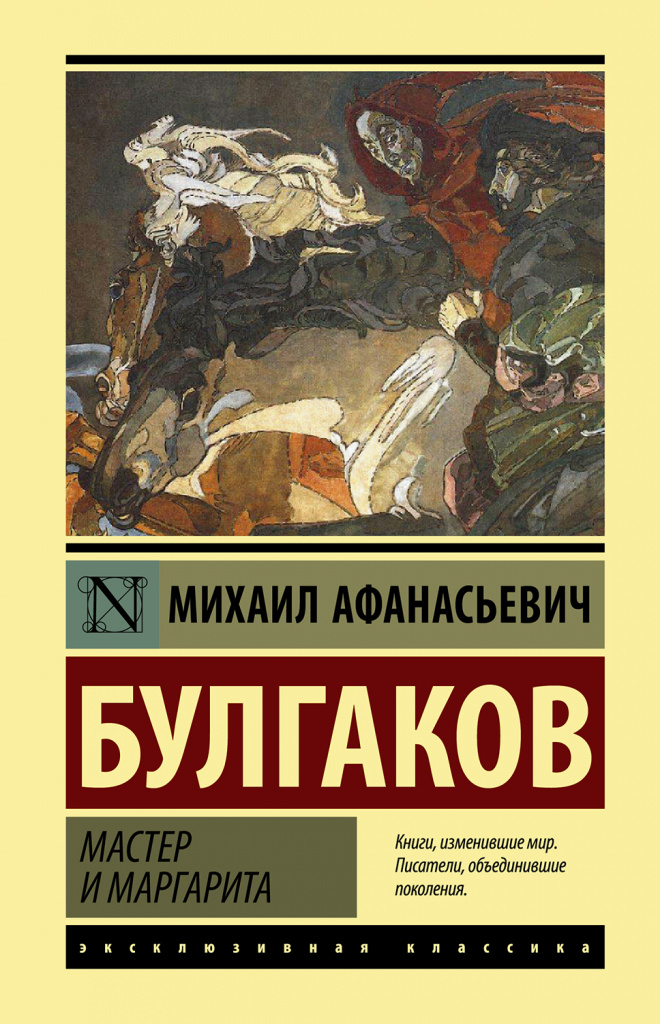
The second place in the rating is in the mystical novel “Master and Margarita” by Mikhail Afanasyevich Bulgakov, who is recognized as the most mysterious work of classical Russian literature. Since 1966, it has been published three times, and its names have changed. The book refers to the unfinished creations of the author. Informing the drafts involved Bulgakov's widow. The final version was presented to readers in 1990.
The action of the book begins on a sunny May day, when the writer Mikhail Berlioz and the poet Ivan Bezdomny, strolling on the Patriarch's Ponds, meet a strange man who looks like a foreigner. None of them suspects that this is the devil himself - Woland. His prophecies about the death of Berlioz come true, the writer falls under the tram and cuts off his head. Satan, along with his servants, arranges various jokes and hoaxes in Moscow.
The history of the Master and Margarita reflects the essence of that time. He ends up in a psychiatric hospital due to a misunderstanding of his novel and refusal to print, harassment in the press. She is ready to lay the soul to the devil, just to find out where the beloved person is. The book can be re-read several times, and each becomes more interesting than the previous one.
"Dead Souls" Nikolai Gogol
Rating: 4.8
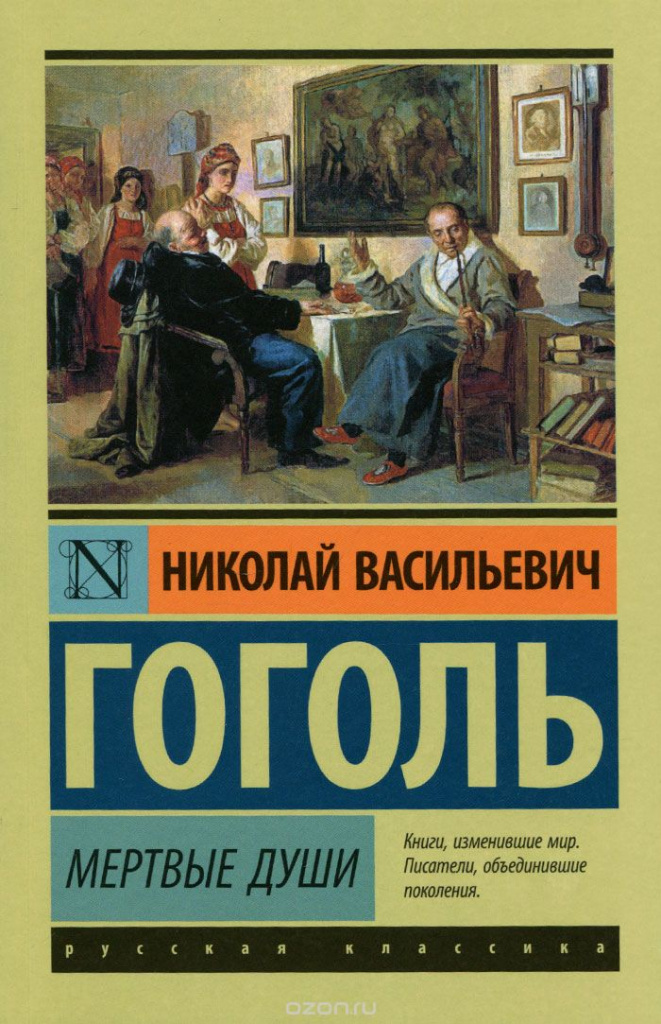
The great Russian classic Nikolai Vasilievich Gogol and his immortal work are in third place in the ranking. Acquaintance with him begins in school years. As they mature, it does not lose relevance and, after re-reading it at a more conscious age, new details are revealed that you do not notice in your youth. The work on the idea of the author was to come out in three volumes. But if the first book was published in 1842, then only a few draft chapters remained from the second, and the third was never begun.
The main character is Pavel Ivanovich Chichikov. Former collegiate adviser arrives in the city of N, where skillfully impersonating a landowner. He is confidently rubbed into the confidence of the locals, who do not know that the true goal of an adventurer is to get rich in any way possible. The scam is that the deceased peasants, still listed as living, rewrite in their own names, thereby increasing their social status.
In a humorous form, Gogol describes the inhabitants of the town, their habits and vices. Many surnames have become common nouns. Manilovshchina called inactive attitude to everything around. Plyushkin became an example of greed and harshness. A classic work provides an opportunity to look at the life of the Russian province through the prism of author's satire and enjoy the interesting and original style, unlike others.
“Crime and Punishment” Fyodor Dostoevsky
Rating: 4.8
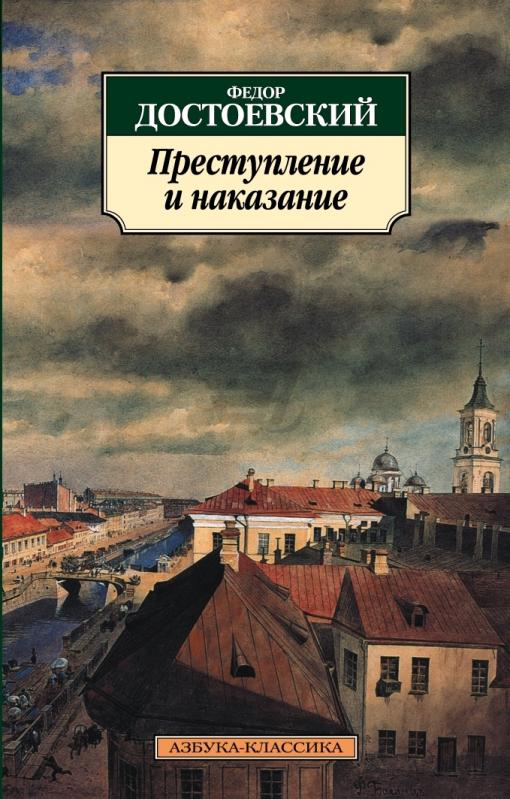
The socio-psychological work was first published in 1866 in a journal variant. The book published a year later was changed and had a number of amendments from the author. Despite the past years, the story is still relevant, as it affects not specific time spaces, but human thoughts and emotions.
Fyodor Mikhailovich Dostoevsky very subtly described throwing the protagonist before the crime and mental agony after the perfect murder of the old woman money lender. Former student Rodion Raskolnikov, who was forced to leave the university due to the inability to pay for his studies, becomes dependent on his thoughts. For himself, he had a clear separation of people into "trembling creatures" and "having the right". Deciding that everything is possible for him, he goes to the crime, justifying himself with good intentions. But this does not bring him relief.
At the end of the work, the hero finds the only right way out for himself and surrenders to justice. The epilogue shows Raskolnikov in a prison in prison, where Sonechka Marmeladova comes to him, who, in order to save loved ones, was forced to sell herself. The book ends on a positive note. The reader is confident that the rebirth of these two people is possible, thanks to love, compassion and self-sacrifice.
"Doctor Zhivago" Boris Pasternak
Rating: 4.8
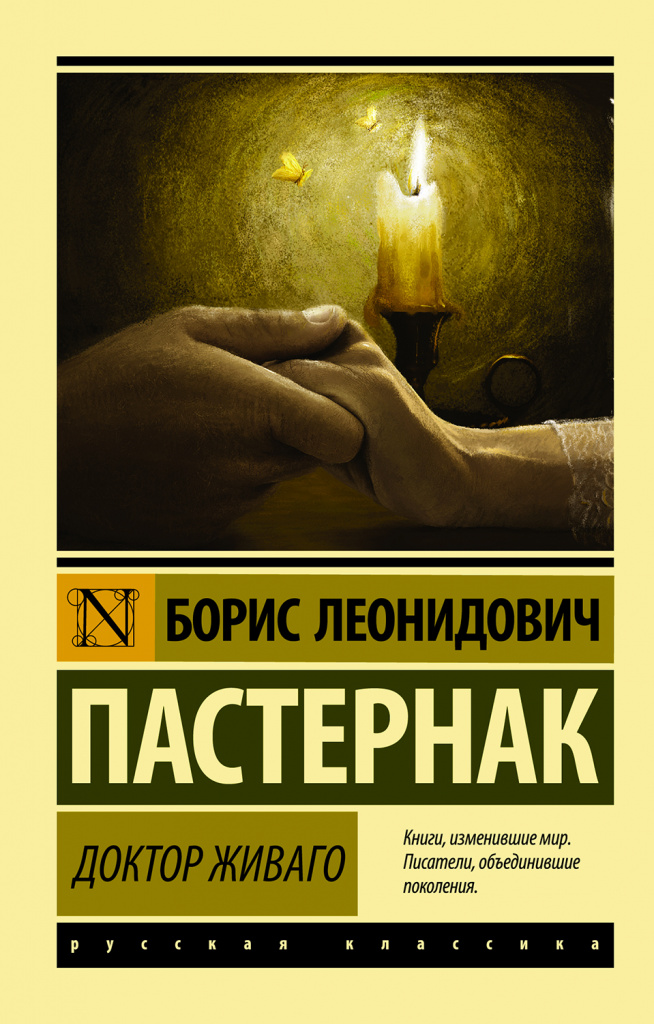
"Doctor Zhivago" - the undoubted Russian classics. The novel included in the rating was created within one decade and is the pinnacle of creativity of the Russian writer and poet, Nobel Prize winner in 1958. The author himself considered the book a matter of his life. In it, Pasternak shows the perepitii of the uneasy life of the intelligentsia, beginning in 1900 until World War II.
The work was banned due to the author’s ideological disagreement with the position of the authorities in relation to many significant events in the country. After the publication of the novel abroad, Pasternak was accused of anti-Soviet propaganda and persecuted. Thirty years later, the novel was published in the author’s homeland, which as a result achieved recognition and fame not only abroad, but also in his own country.
The description of the life of the protagonist begins in childhood, when his mother dies suddenly, and he is forced to move from one relative to another. Growing up, the young man shows a talent for poetry. The dramatic life story of Yuri Zhivago is a kind of biography of the author, only unreal, and the one that Boris Pasternak would like to live himself. Once a forbidden book rewritten by hand. Today there is an opportunity to enjoy the work of the author and find their answers to the questions raised in the novel.
"Eugene Onegin" Alexander Pushkin
Rating: 4.7
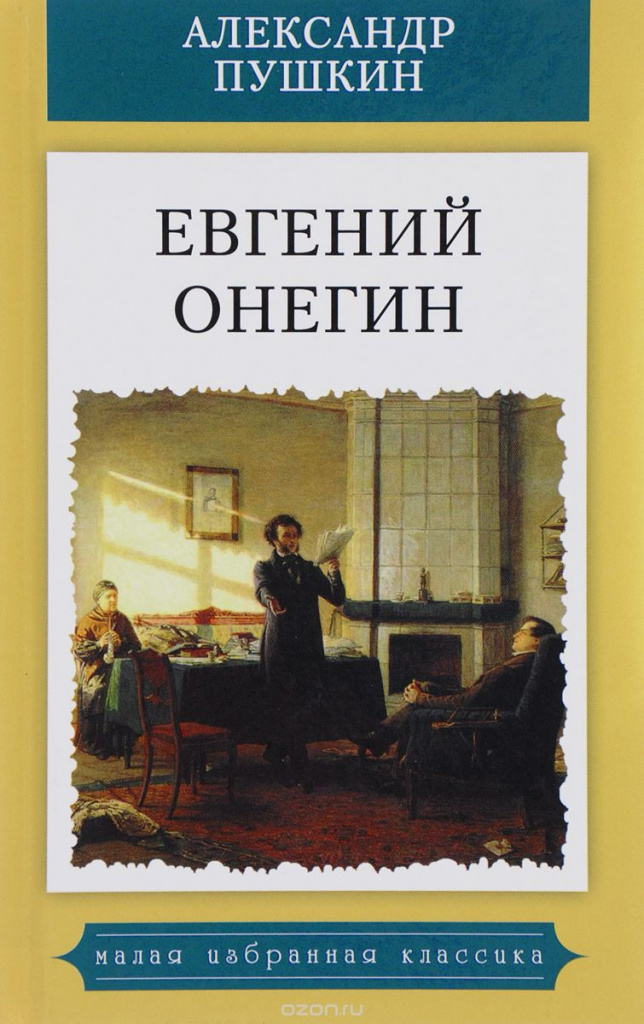
In our country there is not a single person who is not familiar with the brilliant creation of Alexander Sergeevich Pushkin. The novel in verses is recognized as the most significant work of Russian literature. It influenced its further development. The creation took as much as seven years, and the author describes the work on it as a "feat." Pushkin began to write his work in exile in Chisinau. He immediately abandoned romanticism, preferring realism.
Before the reader appears the life of the nobility of the beginning of the XIX century. The book covers the events after the defeat of Napoleon in the Patriotic War, starting in 1819, ending with the Decembrist uprising on Senate Square. The story goes on behalf of an unknown storyteller, who was a good friend of Onegin.
The work of A. S. Pushkin is included in the general education curriculum and is the national heritage of Russia. No wonder V.G. Belinsky called it "the encyclopedia of Russian life." Our experts could not ignore the poem, including it in the ranking of the best world classics, and recommends reading in a more mature age.
"Hero of Our Time" Mikhail Lermontov
Rating: 4.7
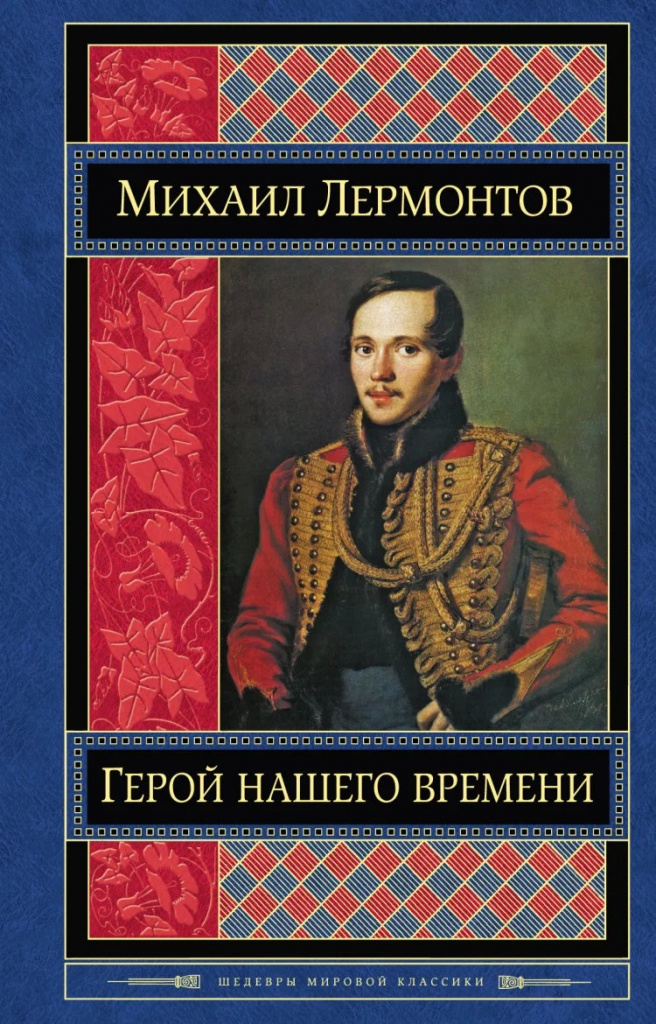
The “Hero of Our Time” was published in 1840 and captured the minds of the people of that time. After almost 180 years, the work has not lost its novelty, it is read with pleasure by both schoolchildren and old people. It is recognized as the first lyrico-psychological novel in history and brought fame as much as poetic works.
The author reveals the diseases of the whole society, tells about the historical features of his era. The main character is Grigory Pechorin. He is eccentric, always accustomed to pursue his goal, while at the same time he absolutely does not care about someone else’s opinion. Young people, having received a good education, could not be realized, they spent their time for constant amusement, which led to satiety and disappointment in life.
The first acquaintance with Pechorin causes complete hostility, but gradually, when the unknown sides of his soul are revealed, you begin to understand and even sympathize with him. M. Lermontov raises several problems that can be correlated to real time: happiness, search for the meaning of life, immorality. But he does not condemn Pechorin, but admits that he became so under the influence of circumstances.
"Fathers and Sons" Ivan Turgenev
Rating: 4.6
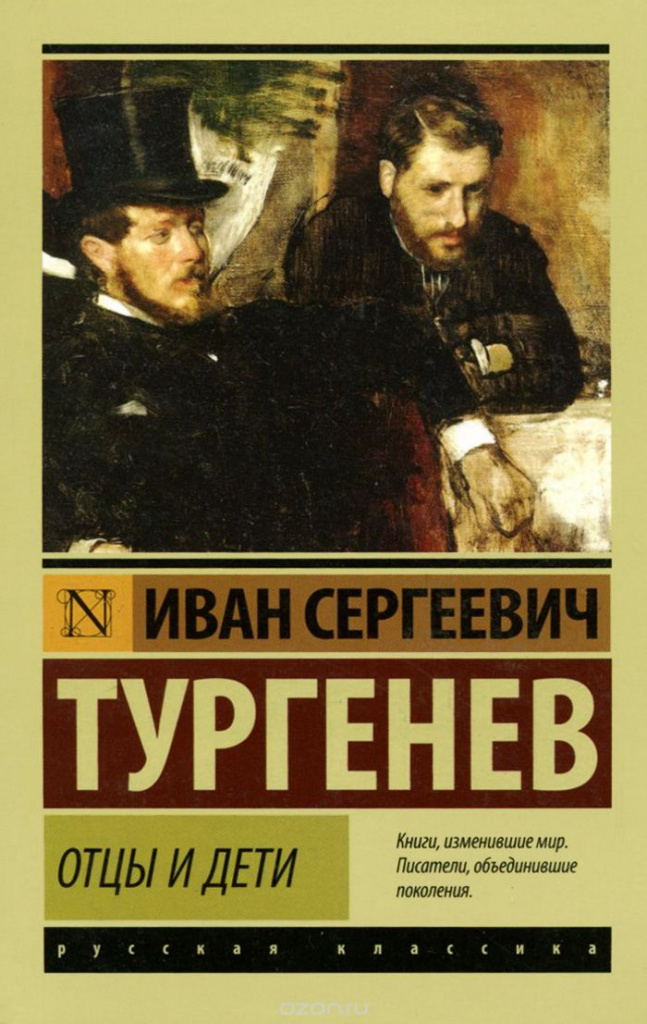
Ivan Vasilievich Turgenev - publicist, prose writer, poet, one of the brightest representatives of the classic literature of the XIX century. After publication, the image of Bazarov was perceived by young people as a symbol of time and an example to follow.The work included in the rating tells about the conflict of two generations, about the eternal confrontation between fathers and children. This problem is relevant at any time, and ours is no exception. Young people want to move forward, not paying attention to the conventions and habits. The older generation is more conservative and does not want to change anything.
Using the example of the main character, the writer wanted to show the mysterious soul of the Russian intellectual. Yevgeny Bazarov is a student, a revolutionary democrat who does not accept either liberal ideas or conservative views. But his nihilistic principles are crumbling and do not stand the test of love. Bazarov realizes that after all he is not a rebel and a rebel who denies everything, but an obvious romantic.
The author very clearly described the acting characters. Many readers can recognize themselves, despite the fact that the action took place 160 years ago. Experts advise the book to be read. It will help to avoid conflict situations and look at the problem through the eyes of all the characters.
“Woe from Wit” Alexander Griboedov
Rating: 4.5
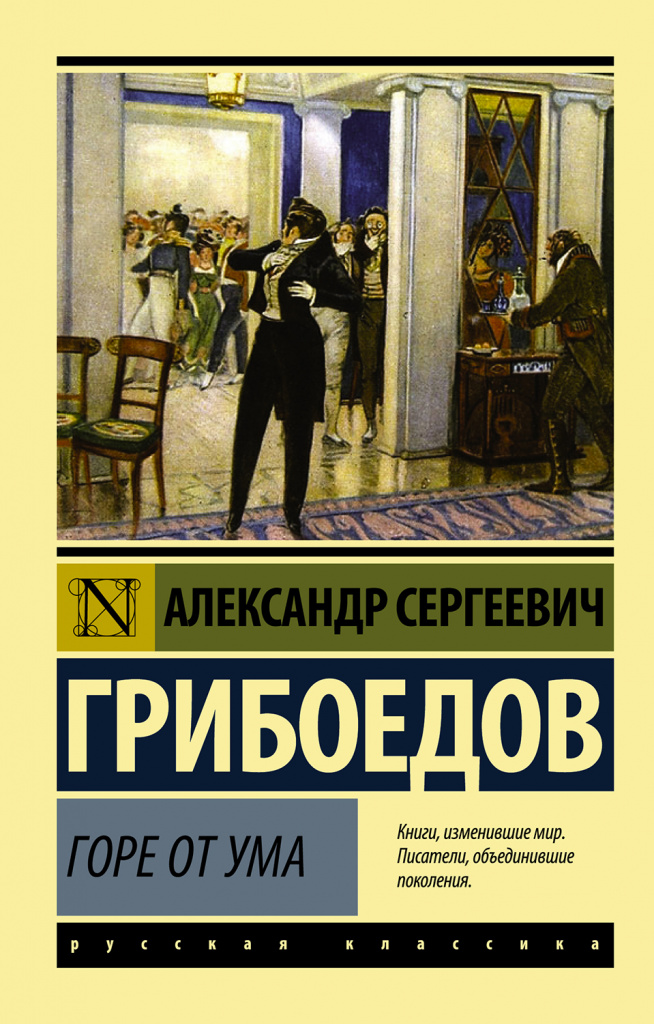
A worthy place in the ranking of the best books of Russian classics is the greatest work of Alexander Sergeyevich Griboyedov and the apotheosis of his work - the famous comedy “Woe from Wit”. The play in verse has become one of the few that is regularly staged in Russian and foreign theaters. Numerous quotes and expressions have long received their own separate life. The action takes place 10 years after the crushing victory of the Russian army over Napoleon.
The book describes the life of secular Moscow society. It shows all the vices of the aristocratic class, and the presence of satire in the description of the characters is of genuine interest. The main idea that the writer wanted to convey to the reader: the protest of a free person against reality. No wonder the product was enthusiastically perceived among the Decembrists.
Alexander Chatsky is a smart, educated young man who is inspired by freedom and fraternity. Returning from abroad to Moscow, he realizes that the wind of change has not touched society, and that ignorance and hypocrisy are also flourishing. And even love leads to disappointment. The work will appeal to both young people and representatives of the middle and older generation.
"The Cherry Orchard" Anton Chekhov
Rating: 4.5
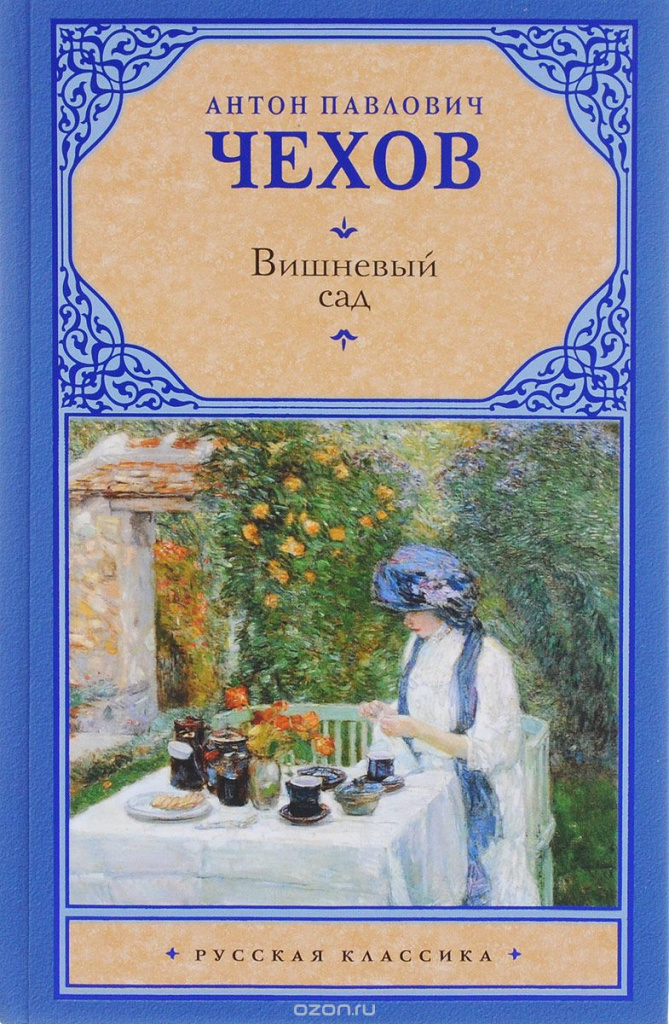
The brilliant creation of Anton Pavlovich Chekhov, created in 1903, closes the top ten of the ranking of the best Russian classics. This was the last work of the writer, completed on the eve of his early death. A year later, the play was staged at the Moscow Art Theater. The audience took her to cheer. A century later, The Cherry Orchard is in the repertoire of not only Russian, but also foreign theaters.
The action takes place in the estate of landowner Ranevskaya, who returned from France back to Russia. She had no money left, and the house with its magnificent cherry orchard could soon be sold for debt. The work has a deep philosophical meaning. In it, the characters of not only the main, but also secondary characters are very clearly revealed. Despite the fact that the play begins as a comedy, at the end it turns into a tragicomedy.
According to the author's idea, the cherry orchard is a symbol of the Russian nobility. Trees are being cut down - family nests are breaking up, a time of change is coming. The author foresaw many events, but failed to see them in connection with the death. It is noteworthy that the greatest actress of the 20th century, Faina Ranevskaya, took her pseudonym from this work in honor of landowner Lyubov Andreevna.
The best books of foreign classical literature
Romeo and Juliet by William Shakespeare
Rating: 4.9
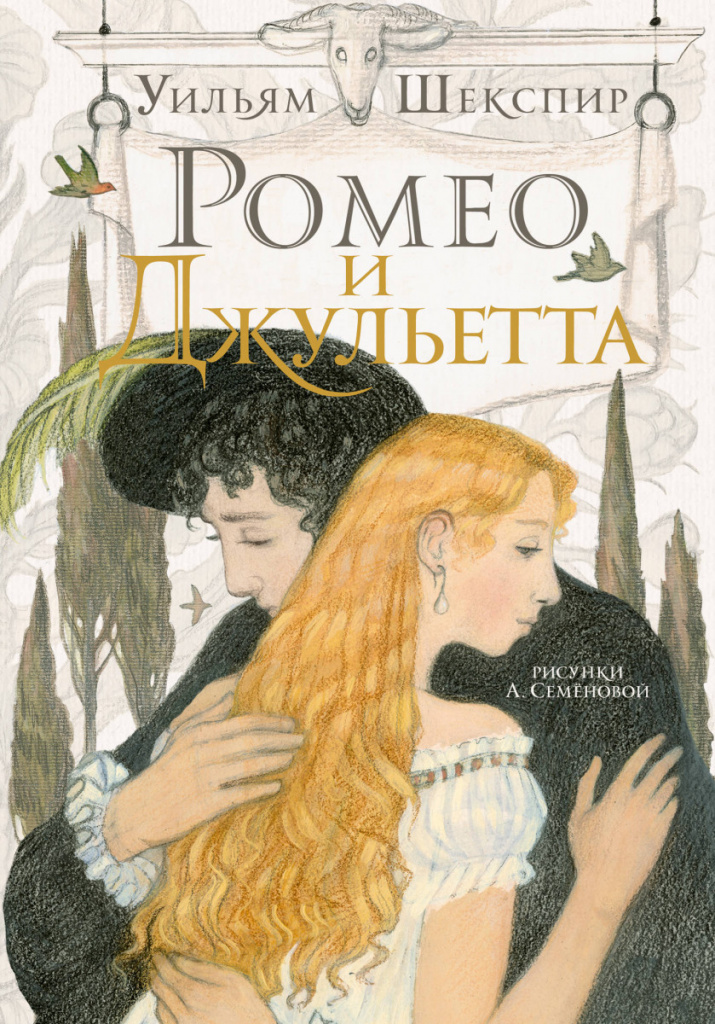
The youthful love of Romeo and Juliet still excites young people, and the mature generation makes you wonder. The first place in the ranking among the books of classical foreign literature is undoubtedly given to the immortal work of William Shakespeare - the most famous playwright of the world. The tragic history written in 1595 leaves no one indifferent.It is put on the stage, they are filmed, they create musical works.
The play was one of the most replicated in the history of literature. Quotes are firmly established in conversational speech. In the city of Verona, where the events of half a century ago unfold, couples come from all over the world to swear eternal love and loyalty. The action takes place against the background of centuries-old enmity of the Italian clans Montecchi and Capulets. Romeo and Juliet's forbidden love leads to a tragic ending. And although the lovers knew that they were not given to be together, they could not resist the feeling that they carried to death.
"There is no sadder story in the world ...". It really is. But the symbolism of the work lies in the fact that true love overcomes all obstacles, despite the age of men and women, prohibitions and prejudices.
"Don Quixote" Miguel Cervantes
Rating: 4.9
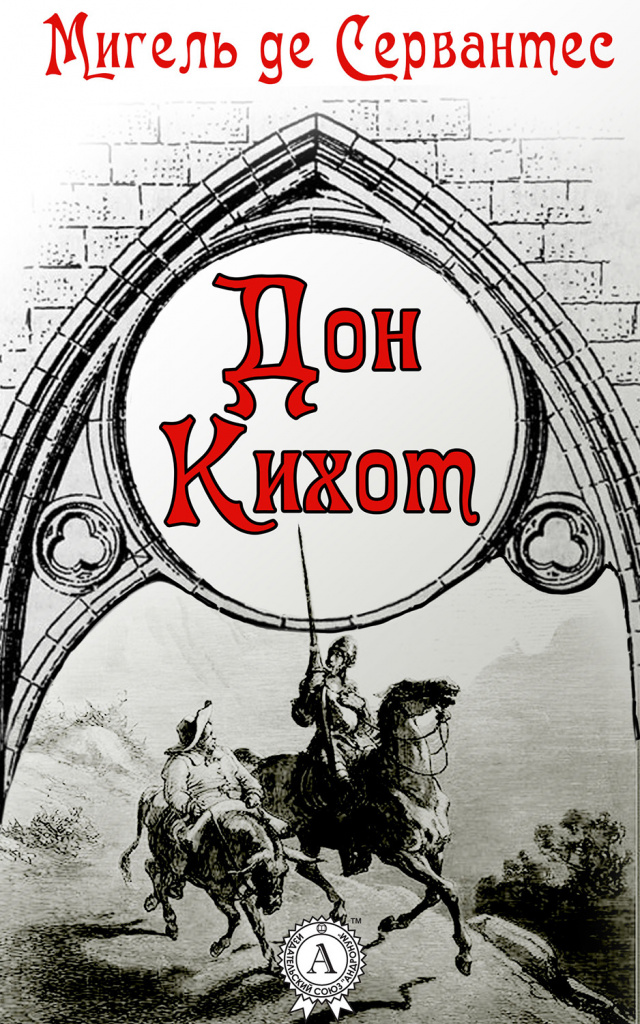
The second place in the ranking is the novel of the Spanish writer, published in two volumes: “The Cunning Hidalgo Don Quixote of Lamanches” and “The Second Part of the Brilliant Knight Don Quixote from La Mancha”, published in 1605 and 1615, respectively. He became one of the most popular works of world literature and translated into all European languages. The writing was inspired by a novel that mocked a farmer who went crazy after reading a lot of stories about knights.
The protagonist is an impoverished nobleman. He is confident that the mission of the knights is to protect the disadvantaged and weak. Don Quixote decides to repeat their exploits, dedicating them to the beautiful Dulcinea. Throughout the story, he finds himself in various comic and ridiculous situations. Nearby there is always the right page, the peasant, and now the servant - Sancho Panza. Soon, Don Quixote realizes that for everyone he was just a joke and forever rejects the image of a wandering knight.
The book will be a wonderful and exciting pastime. The reader will laugh and cry when the hero fights with windmills, mistaking them for monstrous giants, or engaging in battle with a flock of sheep, deciding that this is a transformed wizard army.
"The Count of Monte Cristo" Alexandre Dumas
Rating: 4.8
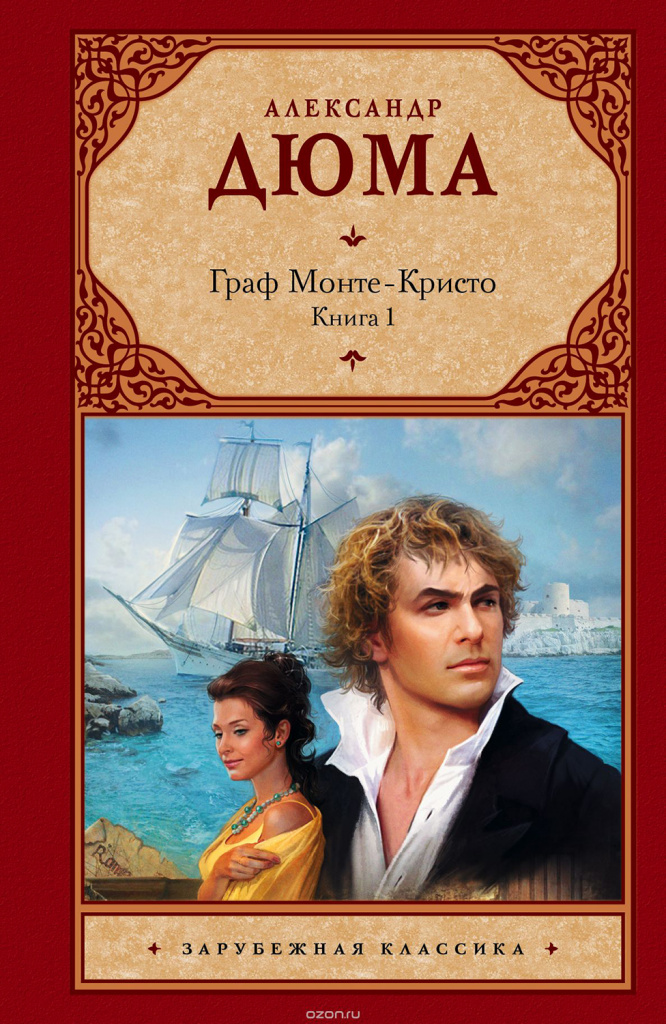
The novel of the French writer entered the treasury of world literature and occupies the third line of our rating. It was published in 1844 and immediately had a smashing success, surpassing all other works of the author. Before writing, Alexander Dumas studied the police archives and came across the case of the shoemaker Francois Picot, who became the prototype for the main character. And while traveling in the Mediterranean, he saw the island of Montecristo and learned the legend about the riches buried there.
Marseille sailor Edmond Danthes, through slander and slander, falls into the castle of If. After a long stay in solitary confinement, he decides to die, but the meeting with Abbe Faria changes his life. He vows revenge on the offenders and prepares the escape he manages. Having stayed on the island for 14 years, he, finding treasures, returns home and generously rewards everyone who was good with him, even the smugglers who saved him, and takes revenge on his enemies. Soon he realizes that he himself becomes a criminal and stops, realizing what he has done.
The novel was screened several times, musicals and performances were staged on it. Incredibly fascinating story like all generations of readers. The book is a desktop, it can be re-read many times.
"Faust" Johann Wolfgang von Goethe
Rating: 4.8
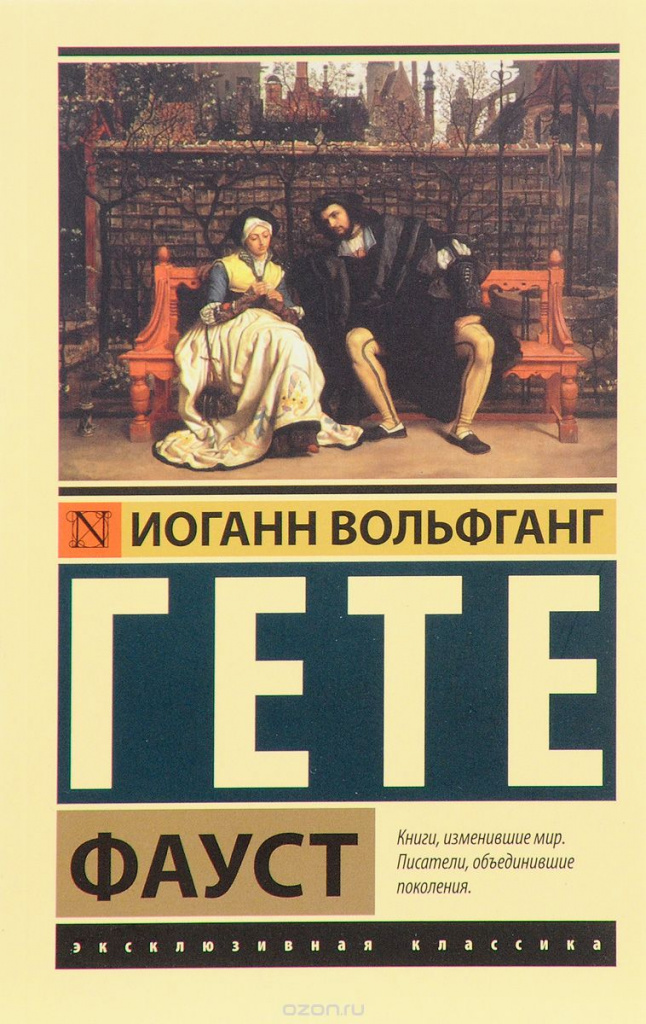
“Faust” is a philosophical work of the German poet and thinker Goethe, on whom he worked almost all his life for 60 years. It became the closest to real life history of the alchemist of the XVI century, the warlock Johann Faustus. Many legends and incredible stories prompted writers at different times to create books about him, but only Goethe was able to rise to such heights and enter the golden fund of the world classics.
The author raises the problem of good and evil, which constantly confront in man.The main character, although he sold his soul to the devil, remains an intellectual, a humanist who dreams of a happy life for all of humanity. He is firmly on the intended path, makes mistakes, overcomes difficulties. But he always has to make a choice, not always the right one, with the result that he does evil to others.
The book of Goethe reflected not only legends, but also ancient myths, scenes from the Bible, philosophical ideas, and folklore. She forced to think about the meaning of life more than one generation of mankind. Modern people are offered an amazing and exciting reading, which is always relevant, happy with the novelty and bored, surely not necessary.
"Martin Eden" Jack London
Rating: 4.7
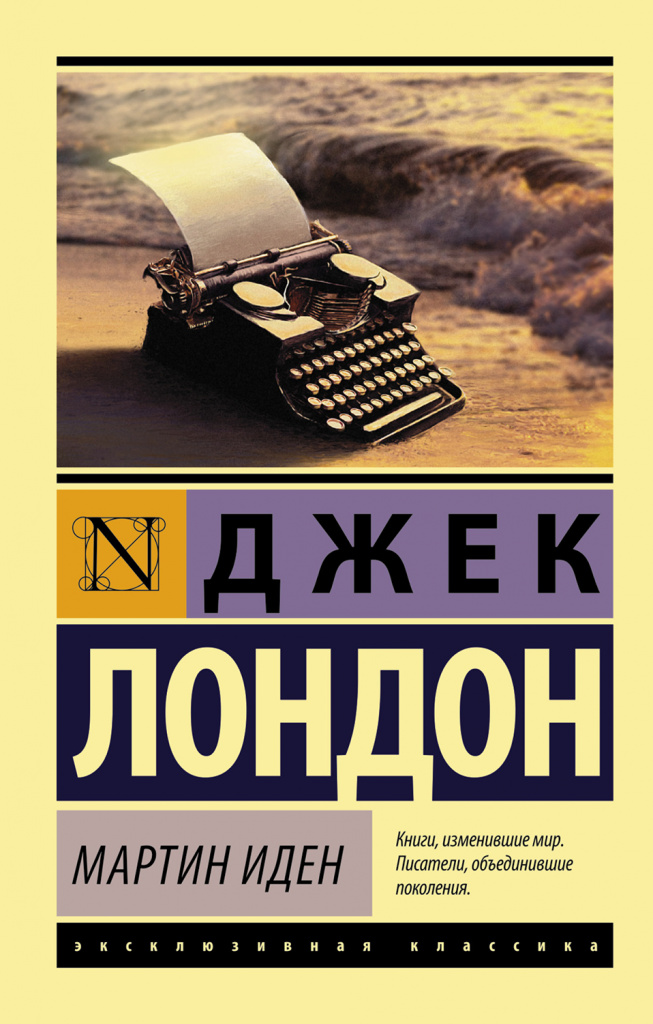
A well-deserved place in the ranking is a work of Jack London, published in 1909. It does not lose its popularity and today is among the hundred best books of the world classical literature. The action takes place in the early years of the XX century. The main character is an ordinary working guy from a poor class. Accidental acquaintance with a girl from a wealthy family turns into love.
The boundless social gulf does not stop Martin Eden, and he, by all means, wants to become worthy of his chosen one and a part of high society. Taking up self-education, he intends to become a writer, having learned about the fees paid by the printed edition to the authors. Ruth is actively helping him in this. A young man learns to write correctly and correctly pronounce words, reads books.
Soon after unsuccessful attempts to sell his stories, essays and poems to magazines, one publication agrees to publish his work. But success does not lead to happiness. Disillusioned with everything and even love, Martin leaves the city on a ship to live alone on a small island in the ocean. But the will to live leaves him, and he jumps into the water. The work is very dynamic, tragic, but after reading it, you always wonder what the most important thing in this life is: a full, rich life or a quiet life in frets with its own conscience.
"Headless Horseman" Mine Reed
Rating: 4.7
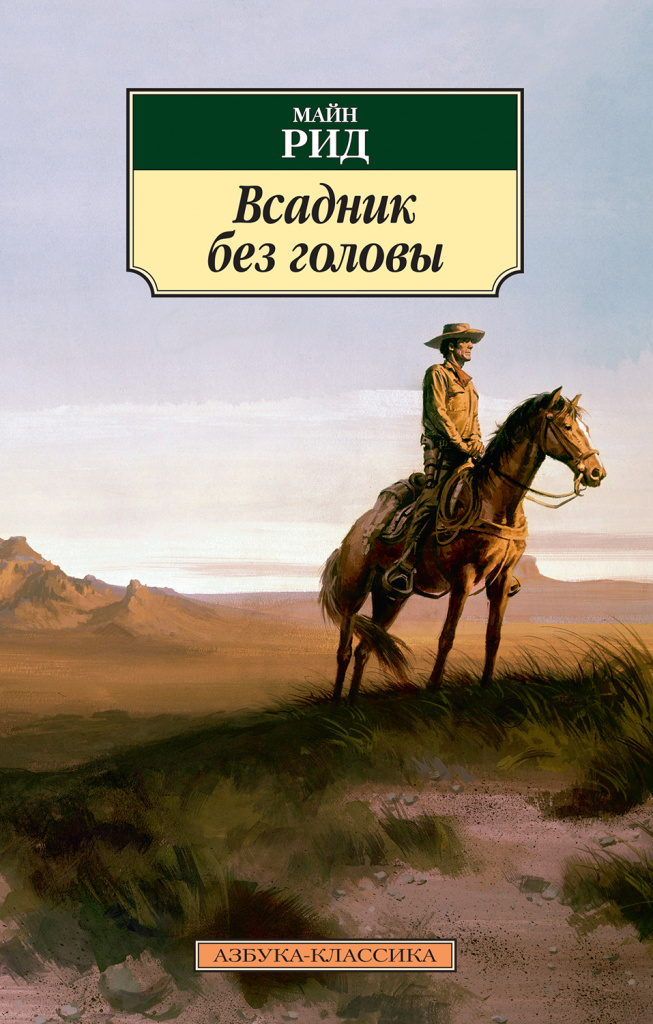
The mysterious story, written by Mine Reed in 1865, takes the next place in the ranking. It was based on the author’s own adventures in America. The action takes place in the middle of the XIX century, when the US captured Texas and began to conquer its vast territory. The once rich but ruined planter with his family moved to a new home located in the wild prairies in the south-west.
An acquaintance with Mustanger Maurice Gerald leads to an emerging feeling between him and Louise, the daughter of a displaced Woodley Poindexter. His nephew also has views of a girl, especially since his uncle has a large monetary debt to him. A cowardly and arrogant, overcome by torments of jealousy, Kolhoun decides to destroy the enemy by inventing a cunning plan. But he was not destined to come true, and soon he finds himself in the dock for the murder of brother Louise Henry.
The story ends with a happy ending. Maurice receives a large inheritance, marries his beloved, paying all the debts of her family. Fascinating reading captures from the first page. The book will appeal to people of different sexes and ages. Boys and girls, their mothers and fathers, grandmothers and grandfathers gladly reread the work about love and hate, friendship and betrayal.
"Outcast" Victor Hugo
Rating: 4.7
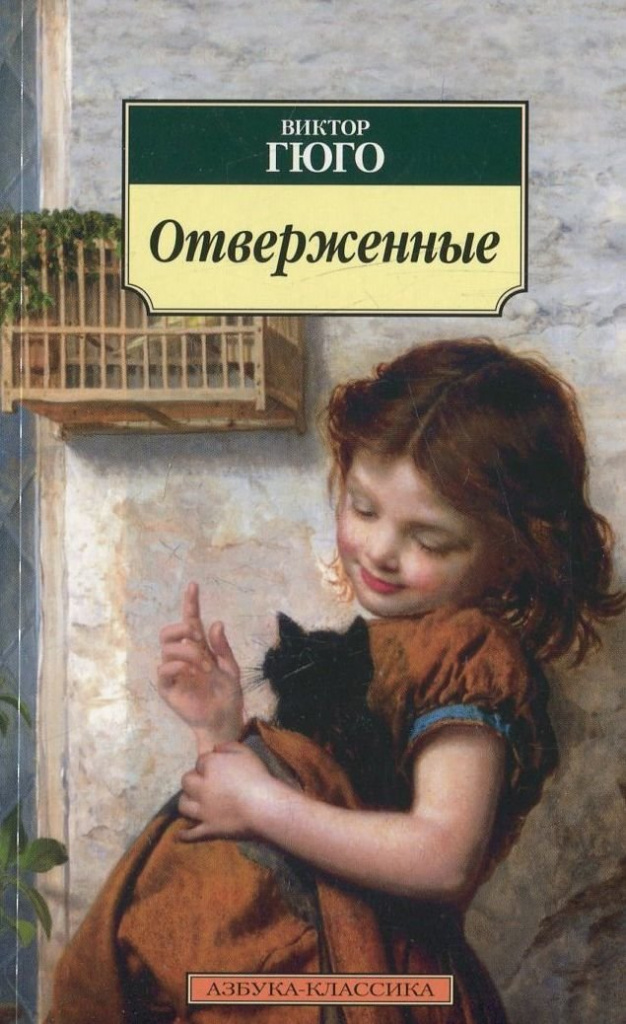
The greatest novel of all times and peoples was created in 1862. He instantly received critical acclaim and rave reviews from readers. The book raises the question of good and evil, morality and immorality, heartlessness and responsiveness. The righteous and the rebel appeared as two opposing traits of one individual.
The example of Jean Valjean shows the path of moral purification. The former convict becomes righteous, engaged in industrial production, cares about his workers.Other characters are naturalistic and faithfully reproduce the society of that time: the street boy Gavroche, the gangsters from the Cock Hour community, the inhabitants of the very bottom of the Tenardieu family. In The Les Miserables, Hugo managed not only to accurately create psychological portraits of the heroes, but also to describe in detail the houses, streets, and landscapes of the city.
The author is fascinating about the events taking place in the past and the future, presenting the reader with interesting facts and the opportunity to become better acquainted with the history of France in the early to mid-19th century. Reading captures and fascinates, you stop only on the last page. The master pen managed to create an immortal work that has been enjoyed for over 150 years.
"Three Comrades" by Erich Maria Remarque
Rating: 4.7
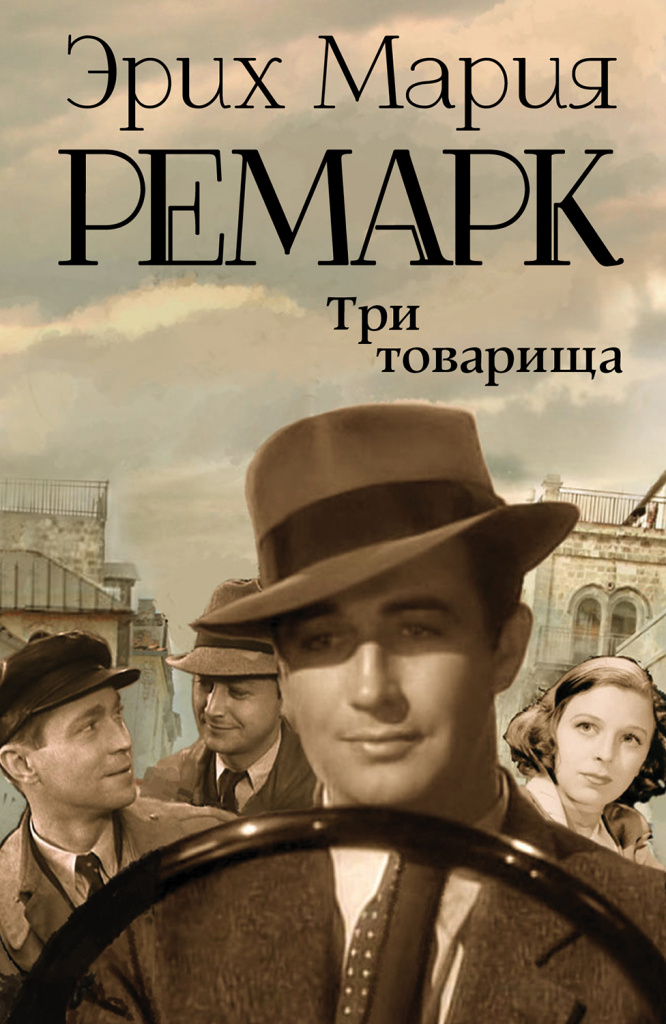
“Three Comrades” is a book worthy of entering the ranking of the best foreign classical works. This is a tragic novel about friendship and love, difficult human relations. It was published in 1936, and 22 years later translated into Russian and instantly earned the love of domestic readers. Today, millions of people around the world consider the novel to be one of the best works of the 20th century, which was subsequently screened and staged in theaters dozens of times, as a result of which its popularity grew even more.
The action begins in post-war Germany in 1928. Three friends, Robert, Otto and Gottfried open a repair shop. All of them are very passionate about cars. On one of her trips, Robbie meets a charming girl and falls in love with her at first sight. They are very different, and, despite the social inequality, they start a touching and gentle romance.
Terrible memories torment the main characters, the echoes of the war do not leave alone. The book very deeply shows the problem of the "lost" generation. Young people could not forget all the horrors of wartime, which left its mark on each of them, and could not adapt to peaceful life, becoming unnecessary members of society.
"The Old Man and the Sea" Ernest Hemingway
Rating: 4.6
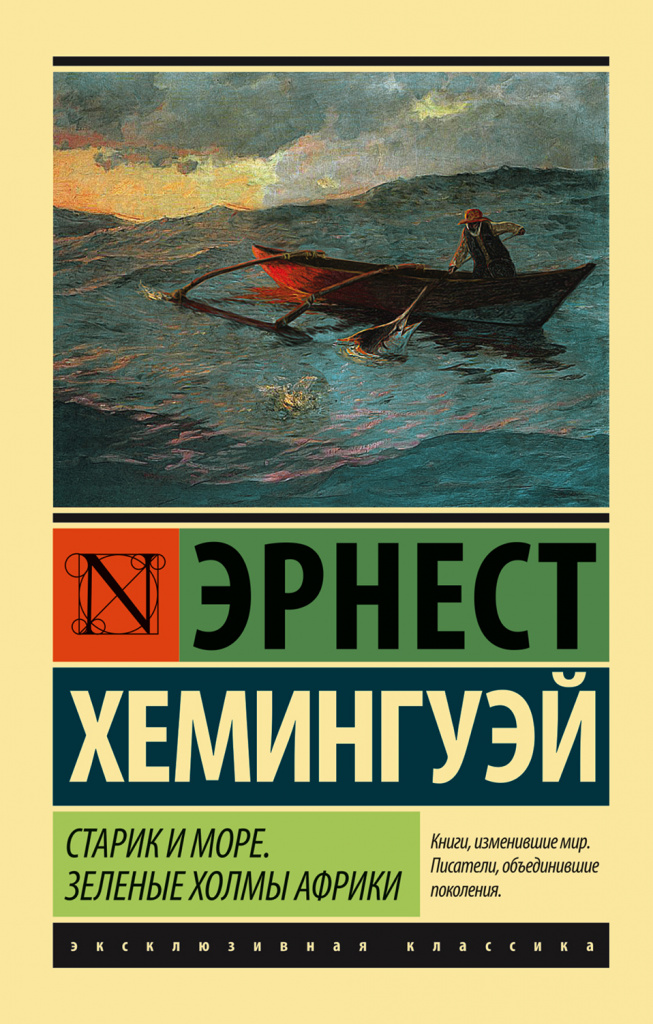
The last, published during the life of the author, was published in 1952. A year later, the American writer and journalist Ernest Hemingway was awarded the Pulitzer Prize, and two years later he received the Nobel Prize for his mastery, demonstrated in The Old Man and the Sea. In the center of the story - the Cuban fisherman Santiago. For nearly three months he has not had a catch. Surrounding people consider him unlucky, and he, too, begins to think so.
The only friend and support for the old man is the boy Manolin, who is prohibited from fishing with Santiago, but he helps with everything: he brings tackles, cooks food, leads conversations. One day, an old man goes out to sea and incredible luck smiles at him: he catches a giant marlin five or more meters long. For two days and two nights, he is trying to get the fish ashore. He speaks to her, understanding her pain and powerlessness, calls her brother. On the third day, the blood of marlin attracts sharks. The old man kills five of them, but the rest completely eat up the carcass of fish.
Santiago gets to the beach, making sure that he is really unlucky. The skeleton left at the boat attracts the attention of the locals. Based on the work, movies and television series, cartoons, and performances were created. It touches the reader to the depths of his soul, forcing him to reread again and again.
"The Little Prince" by Antoine de Saint-Exupery
Rating: 4.6
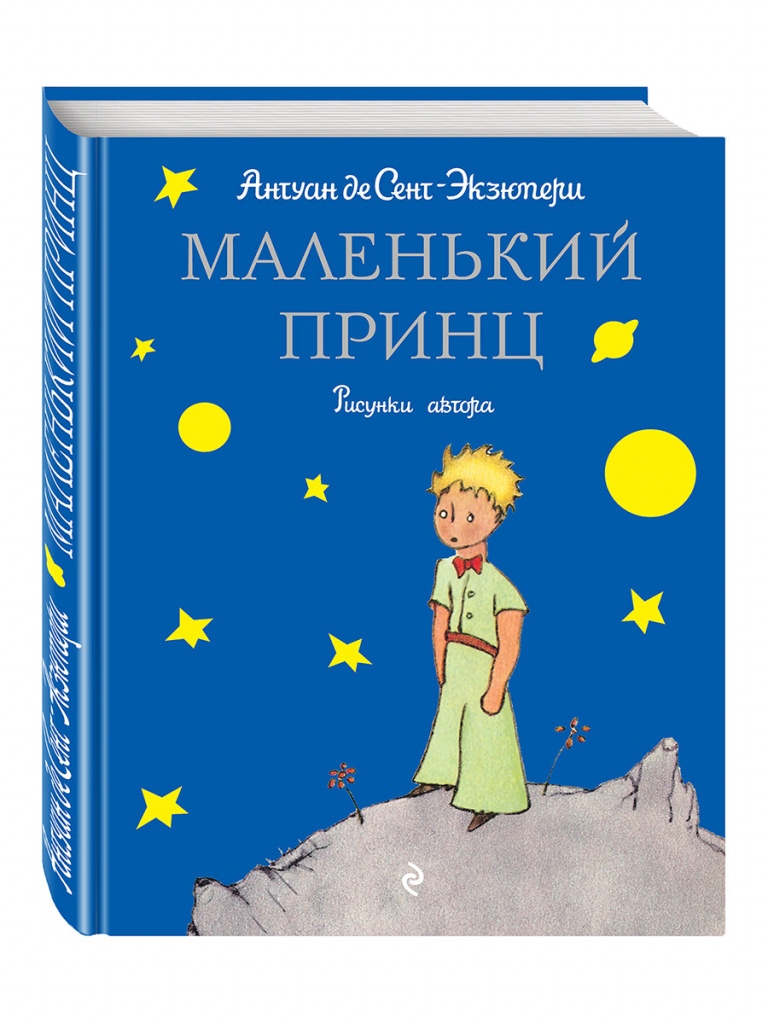
Our rating is completed by the favorite work of millions of people around the world. The Little Prince is the most famous book of the French writer, which was published in 1943. Editor Kurt Hitchcock pushed for its creation, who once saw Antoine in a restaurant displaying a figure of a boy on a table. It turned out that the writer imagined a friend whom he kept in his heart. The editor proposed to write a fairy tale for children. The result was a parable that captured the minds of adults.
All illustrations are personally made by Antoine de Saint-Exupery, and they are part of the work.The philosophical tale tells about a mysterious boy from another planet who meets the pilot who made an emergency landing in the hot Sahara.
The little prince talks about his adventures. He went to study the Galaxy and on his way met different characters: a geographer, a king, a drunkard, a lamplighter. A prototype of the prince was the author himself in childhood. He liked to look at the stars for a long time, for which he was nicknamed “Lunatic”. The main idea of the writer: "All adults were children, only few people remember this."
Attention! This rating is subjective, is not advertising and does not serve as a guide to the purchase. Before buying, you should consult with a specialist.









